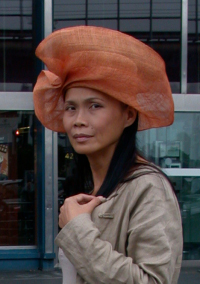
was born in Saigon, the then capital of the Republic in the southern part of war-stricken Vietnam, in 1955. I feared the war throughout my childhood, remembers the daughter of a liberal educator and an officer and journalist. She was educated early on in French schools and after leaving high school at the Lycée Marie Curie moved to France. She started studying History at the University of Nanterre, aiming at becoming a journalist, but soon migrated towards the fashion industry. She then worked as a fashion designer in Paris and Bangkok and lived for some time in Tokyo. She speaks many languages including Vietnamese, French, English, Thai, Japanese and some German. In 1992 she moved back to her home city, now called Ho Chi Minh City.
Here she began to write in French, her second mother tongue, and initially published two slim volumes of short stories presenting scenes from everyday life, penned with humour and discretion. In L'écho des rizières (2001; t: The echo of the paddy fields), the author abruptly combines impressions of Western and Eastern culture from different temporal planes. She writes with as much ease of the Vietnamese plateaus as of a swimming pool in the south-east of France, an ordinary apartment block in downtown Ho Chi Minh City and the island paradise Phu Quoc. Following her second volume, Parfum de pagode (2003; t: Pagoda Perfume), Moï turned to the novel and her work shifted both in theme and key. Riz noir (2004; t: Black Rice) focuses on the sore afflictions of the country's past and describes the fate of two young sisters who were arrested, tortured and interned by South Vietnamese forces. The author intended the work, based on a true incident, also to be understood as a homage to "the fragile and invincible" Vietnamese women. Her second novel, Rapaces (2004; t: Birds of Prey), takes place during the period of French colonial rule and evokes important moments in the country's history, such as the great famine of the winter of 1944/45. The protagonist is a sculptor who becomes involved unwillingly and against his unheroic disposition with the incipient struggle against French colonial powers, and is unable to shake off his feelings of guilt. Moï's latest novel, Violon (2006; t: The Violin) appeared recently, telling the story of a young woman who suffers from dyslexia and grows up in a family dominated by women.
The author was awarded the prize for the best French-language début novel at the Festival du premier roman in Cuneo. In 2006 she was named a Chevalier des Arts et des Lettres for her creations in the artistic and literary field and for her contribution to the dissemination of arts and sciences in France and the world. Moï lives in her native city, where she occasionally performs as a singer, and runs a boutique that sells her designs which are exported as far as to the USA and Japan.